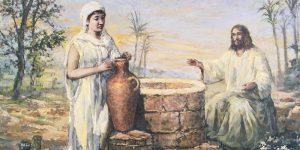
The best way for Christians to get an audience in our cultural moment is by communicating how the good news of the Gospel is not only reasonable, but absolutely desirable. We must share Christ through reason and romance as we engage both the head and the heart with the Truth and Beauty of Jesus.
For the next few months, I will share some beautiful biblical stories of how Jesus engaged both the heads and the hearts of those He encountered. The Bible is God’s story about His mission of mercy; Jesus declared that His mission was “to seek and to save the lost” [Luke 19:10], and it is to be our mission as well.
The Samaritan woman
One of my favorite accounts of our Lord’s searching mercy is found in His divine appointment Jesus had with the Samaritan woman at the well.
“He came to a town in Samaria called Sychar . . . . Jacob’s well was there, and Jesus, tired as he was from the journey, sat down by the well. It was about the sixth hour” (John 4:4-6)
The phrase “sixth hour” is significant; it represents noon, the hottest time of the day.
“When a Samaritan woman came to draw water, Jesus said to her, ‘Will you give me a drink?’ . . . The Samaritan woman said to him, ‘You are a Jew and I am a Samaritan woman. How can you ask me for a drink?’ (For Jews do not associate with Samaritans.)” (John 4:7, 9).
The antipathy between Jews and Samaritans had existed for centuries; the Jewish people considered Samaritans to be “half-breeds,” and the hostility was deep and visceral. Enter Jesus, who traveled through Samaria instead of going around it (as all the Jewish people did), even though it was the longer route, and then engaged in conversation with a Samaritan woman, something no Jewish man would ever do.
An undeserved gift
 “Jesus answered her, ‘If you knew the gift of God and who it is that asks you for a drink, you would have asked him and he would have given you living water. . . . Everyone who drinks this water will be thirsty again, but whoever drinks the water I give him will never thirst. Indeed, the water I give him will become in him a spring of water welling up to eternal life.’ The woman said to him, ‘Sir, give me this water so that I won’t get thirsty and have to keep coming here to drink water.’ He told her, ‘Go, call your husband and come back.’ She replied, ‘I have no husband.’ Jesus said to her, ‘You are right when you say you have no husband. The fact is, you have had five husbands, and the man you now have is not your husband. What you have just said is quite true’” (John 4:10, 13-18).
“Jesus answered her, ‘If you knew the gift of God and who it is that asks you for a drink, you would have asked him and he would have given you living water. . . . Everyone who drinks this water will be thirsty again, but whoever drinks the water I give him will never thirst. Indeed, the water I give him will become in him a spring of water welling up to eternal life.’ The woman said to him, ‘Sir, give me this water so that I won’t get thirsty and have to keep coming here to drink water.’ He told her, ‘Go, call your husband and come back.’ She replied, ‘I have no husband.’ Jesus said to her, ‘You are right when you say you have no husband. The fact is, you have had five husbands, and the man you now have is not your husband. What you have just said is quite true’” (John 4:10, 13-18).
Our Lord’s searching mercy becomes more evident when we learn that the Samaritan woman was a known sinner. We don’t know the reason she had five husbands; perhaps they all died, divorced her, or abandoned her. We do know that she was living in sin with a man who was not her husband. Now we understand why she went to fetch water at high noon. The women would draw water in the morning and evening when it was cooler — never at noon, when the heat was fierce. This woman did everything she could to avoid the disapproving stares of her neighbors; she came to the well expecting to be alone, but searching Mercy sought her out.
“‘Sir,’ the woman said, ‘I can see that you are a prophet. Our fathers worshiped on this mountain, but you Jews claim that the place where we must worship is in Jerusalem.’ Jesus declared, ‘Believe me, woman, a time is coming when you will worship the Father neither on this mountain nor in Jerusalem . . . God is spirit, and his worshipers must worship in spirit and in truth.’ The woman said, ‘I know that Messiah’ (called Christ) ‘is coming. When he comes, he will explain everything to us.’ Then Jesus declared, ‘I who speak to you am he.’ . . . Then, leaving her water jar, the woman went back to the town and said to the people, ‘Come, see a man who told me everything I ever did. Could this be the Christ?’” (John 4:19-21, 24-26, 28-29).
Looking back to the Garden of Eden helps bring this encounter into glorious focus. When Adam and Eve were created, they were naked and unashamed. After their fall, however, they were ashamed of their nakedness, and they ran from God — just as all of us do as sin-filled children of Adam. But when Jesus appeared, everything changed for the Samaritan woman . . . and for us. She realized that Jesus had to be the Christ because He knew everything about her. Nothing about her past or her present was hidden; she was, in effect, naked. But as she stood in the presence of searching Mercy, she was unashamed. We know that because she ran straight to the very townspeople she had gone to great lengths to avoid to tell them about meeting Jesus Christ. She no longer cared what other people thought; she was now living her life for an audience of One.
A desirable message
This beautiful story is your story and mine, and that of everyone who puts their trust in the saving mercy of Jesus. Our loving Lord went to a place others avoided to reclaim one sinful outcast. God’s mercy knows nothing about “the other side of the tracks.” There is no person or place beyond the reach of our Lord.
When we speak of the searching mercy of Christ with genuine love in our hearts, the Gospel is not only reasonable and rational; it becomes desirable. When lost people realize that the One who knows everything they ever did loves them — loves them so much that He died for them — hard hearts begin to soften and broken hearts begin to mend.
“God demonstrates his own love for us in this: While we were still sinners, Christ died for us” (Romans 5:8).
This is the Gospel. This is grace for your race. NEVER FORGET THAT . . . AMEN!
 Dr. Tommy Boland is senior pastor of Cross Community Church in Deerfield Beach (www.thecrosscc.org). He blogs regularly at tommyboland.com. For more articles by Dr. Tommy Boland, visit goodnewsfl.org/tommy-boland.
Dr. Tommy Boland is senior pastor of Cross Community Church in Deerfield Beach (www.thecrosscc.org). He blogs regularly at tommyboland.com. For more articles by Dr. Tommy Boland, visit goodnewsfl.org/tommy-boland.

Comments